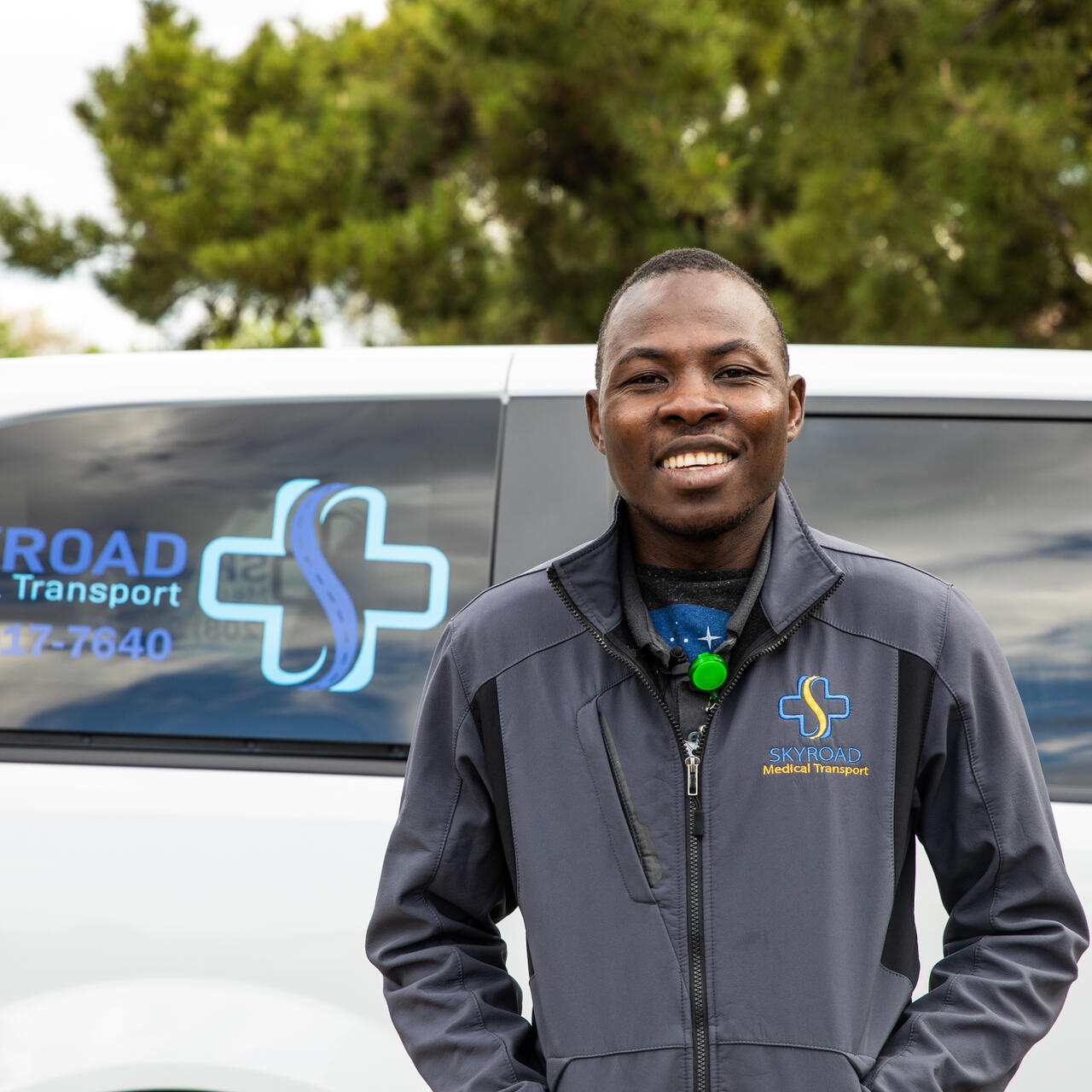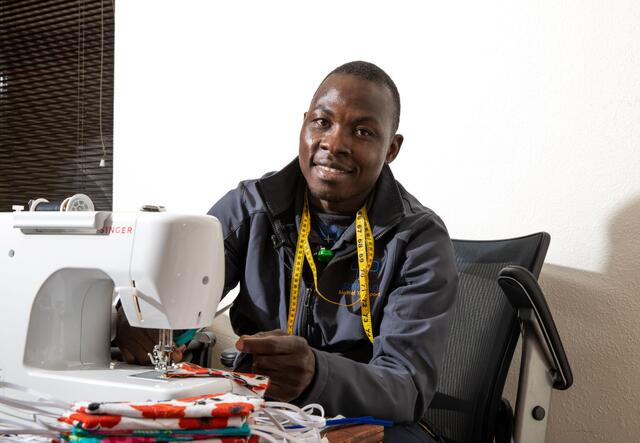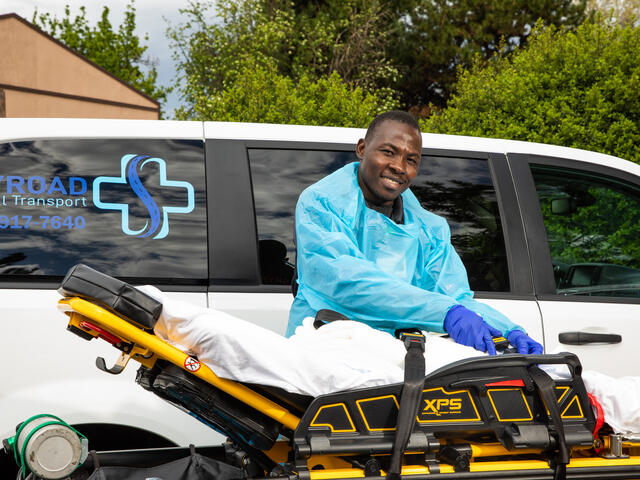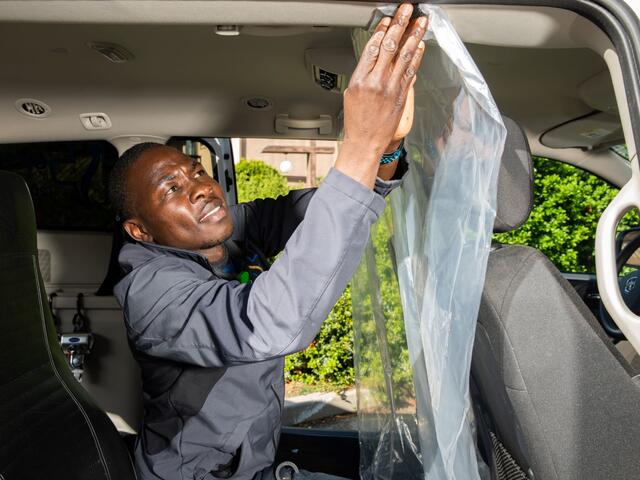
Meet a refugee making masks for his community
Business owner and refugee Jonathan Amissa wanted to keep his staff safe. He ended up helping to protect the rest of Boise, Idaho.

Business owner and refugee Jonathan Amissa wanted to keep his staff safe. He ended up helping to protect the rest of Boise, Idaho.
A refugee from Cameroon resettled in America, Jonathan Amissa is no stranger to sudden challenges. When COVID-19 threatened his new community as well as his brand-new business, he called upon skills honed in his previous life to help save lives—and livelihoods.
Read Jonathan’s story to find out how he went from living on the streets of Cameroon to playing a key role in keeping Boise, Idaho, safe during the pandemic.
When Jonathan Amissa was 10 years old, his life was turned upside down. First his father died, leaving his mother with few resources. His mother passed away a year later. Jonathan went to live with relatives, but they did not treat him well—forcing him to drop out of school. At the vulnerable age of 11, he set off on his own.

“I walked in the middle of the night all the way to the nearest village,” he says. “It was 15, 20 miles or so.”
Jonathan was homeless until he secured work with a baker. He saved enough money to travel to Yaoundé, the capital of Cameroon, when he hoped to restart his life on better terms. He learned to sew so he could make money tailoring used clothes. He took up running, made friends and even joined the Cameroonian youth national running team.
Then an act of kindness would change his life forever.
One day Jonathan found a passport in the street. His natural instinct was to locate the owner. His friends told him not to risk it—the owner, they said, would assume he stole it, and he would end up being arrested.
But Jonathan followed his instincts, found the man, and returned the lost document. The owner, who worked for a refugee agency, was so thankful that he vowed to help this honest teenager and began to research his situation. He discovered Jonathan was not Cameroonian, but that his parents were refugees from Chad, a country that has long dealt with conflict and displacement. This meant that Jonathan could apply for resettlement in a country where he would have a chance to continue his education and pursue his dreams.
He was accepted and the International Rescue Committee helped him resettle in Boise, Idaho, in 2013. “It was like a miracle,” says Jonathan. “How did I get from my village to the United States?”
Jonathan has always wanted to work in health care: “I like to help people,” he says. “Health care, for me, is the best way to get involved in the community.
It was like a miracle. How did I get from my village to the United States?
In Boise, after graduating from high school, Jonathan studied to become an emergency medical technician, or EMT. To pay for the necessary classes, he worked as a lifeguard at the local YMCA and other part-time jobs, but money was perilously tight.
Once again, a chance encounter changed Jonathan’s life. Julianne Donnelly Tzul, the Executive Director of the IRC in Boise, was a regular at the Y. She and Jonathan fell into conversation, Tzul learned he was a resettled refugee. She helped him register with Career Pathways, an IRC program that helps refugees pursue careers in a variety of sectors, including health care. His classes were paid for and Jonathan became an EMT.
“It was a great moment,” he says.

After working for several years in non-emergency medical transport—assisting disabled and elderly people to keep critical medical appointments—Jonathan began to dream about his own business.
“If this is my grandma, this is exactly how I want them to be picked up and how I want them to be treated,” he says, explaining his philosophy that knowledge and skill must be supplemented with empathy and patience.
Jonathan started Skyroad Medical Transport. He was thrilled with his ten employees and with the way the business was growing. New clients would tell him that, because of his professionalism, they would never use any other company. Then came the pandemic.
Health care, for me, is the best way to get involved in the community.
Clients canceled appointments, and obtaining equipment to protect his staff and clients proved to be a challenge. “We ordered PPE (personal protective equipment) when this thing first started, so we could get everything we needed.” he says. “A couple months later, all the orders got canceled. At this point, there's panic. People didn’t know what to do. But I'm, like, “okay, sit down, think about the alternative.’”
I know how to sew, he thought. I can make masks.
Jonathan’s plan was multifaceted: he would make masks and gowns himself. He created barriers between drivers and patients in his vans. He drew up safety guidance procedures for his staff.

His plan was soon tested. Shortly after transporting a woman he believed was healthy, Jonathan learned she tested positive for the virus. He felt confident he and his staff had taken all necessary precautions, but it was a relief when their tests all came back negative.
“Our precautions were a lifesaver and a game changer,” Jonathan says, but stresses that safety continues to be his number one concern. “Every day when I go home, I think: what can we do tomorrow so nobody gets hurt?” What can we do tomorrow so nobody gets infected?”
Jonathan enjoyed sewing the masks so much so that he made more than he and his staff needed. He posted his oversupply on Facebook, offering them to the most vulnerable: older people, veterans in need, workers in assisted-living facilities.
Facebook posts thanking Jonathan led to requests for more masks, and he never slowed down, making enough to provide even strangers with protection: He left 70 masks, all in individual plastic bags, at the entrance to his local park. They were gone in 40 minutes.
View this post on InstagramA post shared by Mandy Patinkin (@mandypatinkin) on
Jonathan’s work came to the attention of the IRC in Boise just as the staff was looking to acquire masks for refugees working in high-risk jobs. Jonathan was only too glad to help the organization that had helped him reach his goals. He has created 75 masks for local refugees so far, all for free.
For me, this is not a moment where you want to make money.
“My mom always told me, ‘Don't take advantage of the moment to gain power.’ For me, this is not a moment where you want to make money. It's a volunteer thing, helping our community be safe.”
As for his business, Jonathan has faith in his staff and his future.
“I have learned so much from my setbacks,” he says. “I trust myself and my drivers. I’m hopeful we can get through this.”